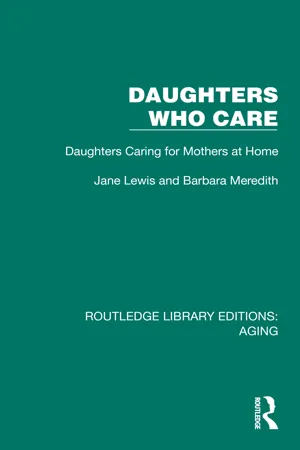
- 204 pages
- English
- ePUB (mobile friendly)
- Available on iOS & Android
About this book
In the 1980s, as the proportion of elderly people in the population grew steadily larger, the task of looking after them would fall increasingly on one group – daughters. The government, in promoting its move in social policy towards community care, had stated that 'the family' – which in practice meant women – must expect to provide the bulk of care in the future. But how do women feel about this? What impact does caring for others have on their own lives? How might professional helpers better support them?
Originally published in 1988, from in-depth interviews with daughters who have looked after their mothers for varying numbers of years, Jane Lewis and Barbara Meredith look at why it is that women come to care, and consider the legacy of their caring experiences. Because caring is usually a labour of love, the feelings that surround it are complicated and fraught with ambivalence. In analysing these Daughters Who Care explores the meaning of caring from the carer's point of view, as well as examining the implications for professionals seeking to 'support the supporters'.
Carers themselves and those working with them professionally or as volunteers, as well as students of community care, social policies for the elderly, and social psychology will all find this a stimulating approach to what is still an increasingly urgent issue.
Frequently asked questions
- Essential is ideal for learners and professionals who enjoy exploring a wide range of subjects. Access the Essential Library with 800,000+ trusted titles and best-sellers across business, personal growth, and the humanities. Includes unlimited reading time and Standard Read Aloud voice.
- Complete: Perfect for advanced learners and researchers needing full, unrestricted access. Unlock 1.4M+ books across hundreds of subjects, including academic and specialized titles. The Complete Plan also includes advanced features like Premium Read Aloud and Research Assistant.
Please note we cannot support devices running on iOS 13 and Android 7 or earlier. Learn more about using the app.
Information
Table of contents
- Cover
- Half Title
- Title Page
- Copyright Page
- Original Title Page
- Original Copyright Page
- Table of Contents
- Acknowledgements
- 1 Caring and carers: the issues
- 2 Why care?
- 3 The caring task
- 4 The mother/daughter relationship
- 5 Carers’ extra-caring lives
- 6 External sources of help
- 7 Responses to caring
- 8 The legacy of caring
- 9 Conclusions
- References
- Resource bibliography
- Appendix A: Interview schedule
- Appendix B: Caring vocabulary
- Appendix C: Benefits for carers
- Appendix D: Institutional accommodation for elderly people
- Index